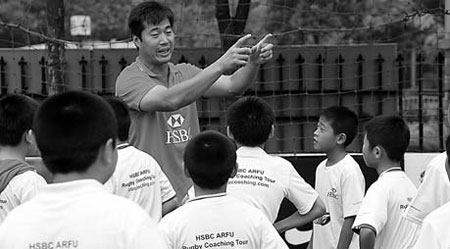Long road to travel to Olympic competitiveness
Updated: 2012-09-30 08:09
By Sun Xiaochen(China Daily)
|
|||||||
|
China's national Rugby Sevens coach Johnny Zhang instructs students from Shanghai Pingliang Road No 4 Primary School at a clinic on Sept 21. Photo Provided to China Daily |
Rugby Sevens' popularity in China has surged since its inclusion in the 2016 Olympics, but there's a long way to go before it hits the mainstream.
In a country, where the sports authority is obsessed with Olympic glory, the sport began drawing massive attention after it was announced it will be part of the slate in Rio de Janeior.
More than 300 professionals from 11 provincial teams have been competing in national tournaments held twice a year the past two years, and the players' income has significantly increased as more government support and sponsorships have gotten involved.
Still, it's not enough and the gap remains huge, said national team coach Zhang Zhiqiang (also known as Johnny Zhang).
"It means great things for us (that we've become an official Olympic event). But we still lag far behind. There are no big changes yet, at least in the size of the talent pool," Zhang told China Daily during the HSBC Shanghai Sevens tournament last week.
The field is tough indeed as China lost to Hong Kong, 40-10, in the Shanghai event following its one-win pool-stage knockout at the Hong Kong Sevens earlier this year.
Despite the rise of the first-division squad, the shrinking size of teams in local sports schools and colleges continues to draw concern from the governing body.
The reason is a lack of coaching, Zhang said.
"The biggest problem is we don't have legitimate coaches to nurse the talent at the bottom of the system," said the 38-year-old, who captained the national squad from 1998-2010. "Many of the coaches on youth teams shifted from other sports after taking orders from the authority to build it up as the Olympic and National Games (next year) are coming. Some of them never touched a rugby football or knew any rules before."
Even some national players have been borrowed from other sports.
Liu Guanjun, the national wingman, used to be a college basketball player but accepted an offer from the Beijing municipal team for a chance at a better living.
"A chance to play in the Olympics gave us a way to make a living in this sport. It means playing rugby could be a decent job, no longer just an interest," said the 23-year-old.
Liu's teammate Lu Zhuan, who has invested himself in the sport for 10 years, echoed Liu, saying salaries have improved.
"With the sport gaining more popularity after entering the Olympics and National Games, we've been treated much better than before," Lu said.
Zhang said national-level players like Liu and Lu earn about 80,000 yuan ($12,688) a year - equal to a white-collar's annual pay in Beijing - from their local teams and will be awarded prize money of 30,000 yuan (which was only 2,000 three years ago) for each win at national tournaments.
As the highest-profile Chinese player in the world's top echelon, Zhang holds the record of 47 tries in Hong Kong and became a household name while playing for a local club in Australian league in 2001.
He attributed it to his oversea experience.
"My advice is to try to send more players abroad, not only for the descent pay but the much more advanced coaching and environment," he said.
Two national players, Li Yang and He Zhongliang, now compete in Japan's first-class professional league with annual salaries of around 700,000 yuan.
Zhang also said the governing body should bring in more foreign coaches.
"Building a complex crew with Chinese and foreign trainers is very important for every sport, as it is with rugby. (Foreigners) are more professional and dedicated to the sport."
Including a tactical consultant with the Shandong team, there are only four foreign coaches in China with Anhui and Jiangsu, said Zhang.
sunxiaochen@chinadaily.com.cn
(China Daily 09/30/2012 page11)
